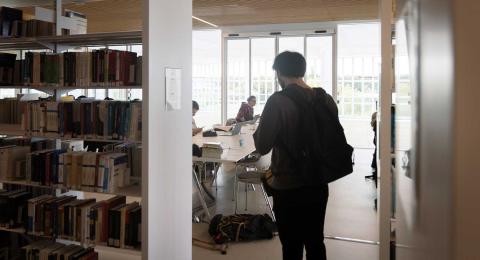The Integration Circuits and Systems M2 is a curriculum in electronic design. It is jointly run by three leading institutions in the field of electronic design: CentraleSupélec, TelecomParisTech, and Paris-Saclay University.
The M2 program is structured around courses (from September to March) that focus on projects and practical work ( giving students firsthand experience with a range of professional analog and digital CAD tools), followed by an internship period (starting in early April).
Information
Skills
Integrated electronic circuit and system design
Objectives
The objective of the M2 “Integration Circuits and Systems” is to train future researchers or engineers with extensive knowledge and skills in advanced domains of electronic design: analog/digital CAD of microelectronics, analog/digital embedded systems, components and systems for telecommunications, AD/DA conversion, hardware signal processing, sensor interfaces, MEMS, etc.
Career Opportunities
Career prospects
Après un Master ou Master + Doctorat : chercheur ou enseignant-chercheur
Ingenieur R&D
ingénieur étude conception
Consultant
Ingénieur d’études dans les domaines de l’industrie
Ingénieur d’études dans les domaines de la recherche
Ingénieur d'études industrie / recherche publique
Enseignants-chercheurs
Further Study Opportunities
Doctorat
Doctorat / PhD interdisciplinaire en Science de la durabilité (nombreuses disciplines possibles)
Fees and scholarships
The amounts may vary depending on the programme and your personal circumstances.
Capacity
Available Places
Target Audience and Entry Requirements
M1-level students with advanced traing in analog and digital electronics.
Application Period(s)
From 02/02/2026 to 21/06/2026
Supporting documents
Compulsory supporting documents
Rank of previous year and size of the promotion.
Motivation letter.
All transcripts of the years / semesters validated since the high school diploma at the date of application.
Certificate of English level.
Certificate of English level (compulsory for non-English speakers).
Curriculum Vitae.
Detailed description and hourly volume of courses taken since the beginning of the university program.
Details of the UEs taken for candidates outside the M1 Paris Saclay.
Additional supporting documents
VAP file (obligatory for all persons requesting a valuation of the assets to enter the diploma).
Document indicating the list of local M2 choices available here : https://urlz.fr/i3Lo.
Supporting documents :
- Residence permit stating the country of residence of the first country
- Or receipt of request stating the country of first asylum
- Or document from the UNHCR granting refugee status
- Or receipt of refugee status request delivered in France
- Or residence permit stating the refugee status delivered in France
- Or document stating subsidiary protection in France or abroad
- Or document stating temporary protection in France or abroad.
| Subjects | ECTS | Semestre | Lecture | directed study | practical class | Lecture/directed study | Lecture/practical class | directed study/practical class | distance-learning course | Project | Supervised studies |
|---|---|---|---|---|---|---|---|---|---|---|---|
| Internship | Semestre 2 | ||||||||||
| Subjects | ECTS | Semestre | Lecture | directed study | practical class | Lecture/directed study | Lecture/practical class | directed study/practical class | distance-learning course | Project | Supervised studies |
|---|---|---|---|---|---|---|---|---|---|---|---|
| Circuit nanoarchitecture and deep learning (NARCHI) | Semestre 1 | 16 | 12 | ||||||||
| Advanced Analog-to-digital converters and Digital-to-Analog converters (CAN) | Semestre 1 | 9 | 3 | 12 | |||||||
| Mixed-signal, Analog & RF Systems for communicating objects (SMART) | Semestre 1 | 24 | 0 | 4.5 | |||||||
| High performance sensors and transducers (HiPSTR) | Semestre 1 | 3 | 21 | ||||||||
| Fundamentals in AMS & RF Electronics (FARE) | Semestre 1 | 19.5 | 0 | 9 | |||||||
| Cell Design For Digital Integrated Circuits (CD2IC) | Semestre 1 | 12 | 17 | ||||||||
| CAD of Mixed Integrated Circuit (CAD1) | Semestre 1 | 3 | 21 | ||||||||
| Algorithms and Architectures for Digital Computing (A2HW) | Semestre 1 | 21 | 9 | 12 | |||||||
| Advanced Digital Electronics (ADE) | Semestre 1 | 7.5 | 7.5 | 9 | |||||||
| Advanced Design Methodologies (CAD2) | Semestre 1 | 1.5 | 1.5 | 27 | |||||||
| Analog Circuits Architectures (ARCHAN) | Annualisé | 24 | 6 | ||||||||
| Project (PRJ) | Semestre 2 | ||||||||||
| UE libre S1 | Semestre 1 | ||||||||||








